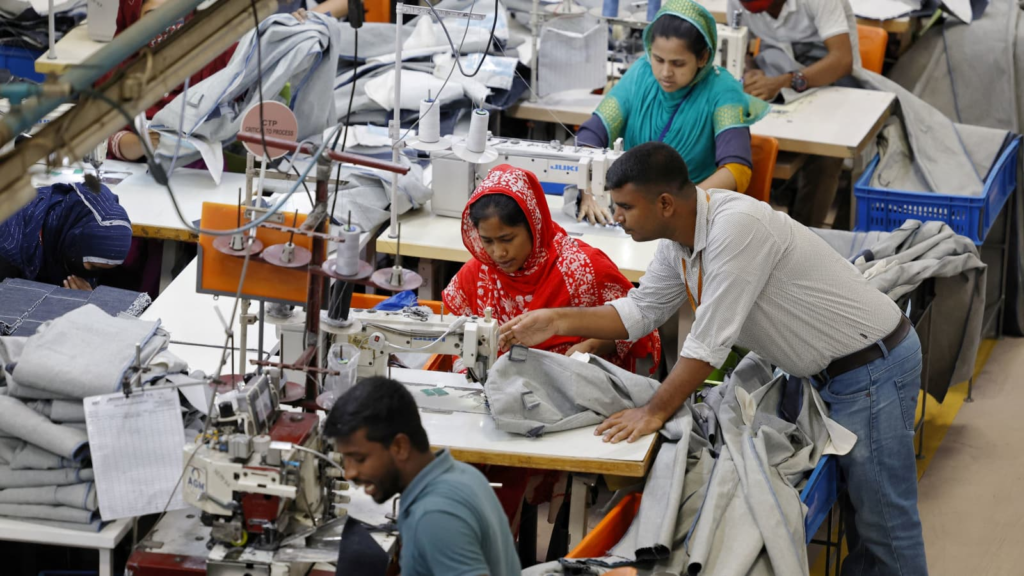Some Walmart garment orders from Bangladesh are now on hold due to growing concerns about new U.S. tariffs. This unexpected move has created uncertainty for Bangladesh’s massive apparel industry, which heavily relies on exports to American retailers like Walmart. With billions of dollars at stake and thousands of jobs on the line, the situation is drawing global attention.
This development highlights how fast-changing international trade policies can directly affect global supply chains, especially for developing countries like Bangladesh.
Background: Why Bangladesh Matters to Walmart Garment
Bangladesh is the second-largest exporter of garments in the world, just behind China. Its low production costs, skilled labor, and strong manufacturing infrastructure make it a top choice for global retailers—especially fast-fashion giants like Walmart, H&M, and Target.
Walmart, one of the world’s biggest buyers of clothing, sources a significant share of its low-cost garments from Bangladesh. These include t-shirts, jeans, children’s wear, undergarments, and other everyday essentials sold in Walmart’s 4,500+ stores across the United States.
But recent developments in U.S. trade policy are beginning to change the landscape.

The Tariff Threat from the United States
According to multiple reports, the U.S. government is considering new tariffs on imported garments, including those made in Bangladesh. While not officially announced, these potential tariffs are part of a larger trade strategy to balance global trade and support American manufacturing.
Even though Bangladesh currently benefits from Generalized System of Preferences (GSP)-style exemptions, the current trade tensions have put those privileges at risk. Sources say that Bangladesh’s labor conditions, political factors, and trade imbalances are being reviewed as part of broader tariff reform.
As a result, companies like Walmart are taking precautionary steps putting some garment orders on hold until there’s more clarity.
Impact on Walmart’s Supply Chain
Walmart has reportedly paused five major apparel orders from Bangladeshi manufacturers. These orders were scheduled to be shipped in the coming weeks but are now delayed indefinitely. While Walmart hasn’t issued an official statement, industry insiders suggest the company is “waiting to assess the tariff risk” before committing to further imports.
This kind of pause can:
- Disrupt delivery timelines
- Affect Walmart’s inventory levels for upcoming seasons
- Increase costs if alternative suppliers (like Vietnam or India) are used
It also sends a strong signal to suppliers: even big buyers like Walmart are not immune to trade policy uncertainties.
Reaction from Bangladesh’s Garment Sector
The news has sparked concern among garment manufacturers in Bangladesh. Many factories in Dhaka and Chittagong rely heavily on Walmart and other U.S. buyers for long-term contracts. Delays or cancellations could lead to:
- Factory closures
- Unpaid wages
- Reduced exports
- Loss of investor confidence
The Bangladesh Garment Manufacturers and Exporters Association (BGMEA) has urged both the U.S. and Walmart to reconsider, emphasizing that Bangladeshi apparel meets international compliance and labor standards.
Jobs at Risk for Workers
Bangladesh’s garment industry employs nearly 4 million workers, most of whom are women. If Walmart and other American brands cut back on their orders, the result could be devastating for the country’s workforce.
Even temporary order delays can lead to wage cuts, layoffs, and unsafe working conditions as factories scramble to stay afloat. This is especially troubling given the economic recovery still underway from the COVID-19 pandemic.
Walmart’s Global Strategy at a Crossroads
For Walmart, this situation is more than a supply chain hiccup—it may be a turning point in their global sourcing strategy. Over the past few years, Walmart has expanded partnerships in other countries like Vietnam, India, and Mexico to diversify supply and reduce dependence on any single country.
If tariffs hit Bangladeshi garments, Walmart may shift more production elsewhere, even though Bangladesh still offers the best prices on many basics. However, such a shift could lead to:
- Higher consumer prices in U.S. stores
- Longer shipping timelines
- Disruption in product consistency
Balancing cost, ethics, and politics is becoming more complicated for global brands.
Will the U.S. Actually Impose New Tariffs?
Experts are divided. Some say new tariffs are unlikely because they could:
- Hurt U.S. retailers and consumers
- Damage relations with developing countries
- Violate World Trade Organization (WTO) agreements
Others argue that rising pressure to boost domestic manufacturing and reduce trade imbalances could push lawmakers to take a harder line, even against traditionally favored partners like Bangladesh.
Until there’s an official ruling, uncertainty remains high, and that’s forcing retailers like Walmart to act cautiously.

What Can Bangladesh Do?
To avoid long-term damage, Bangladesh needs to:
- Strengthen diplomatic ties with the U.S.
- Highlight progress in labor reforms
- Diversify its own buyer base beyond the U.S.
- Explore new free trade agreements (like those with the EU or UK)
Industry leaders are also pushing for greater automation and product quality upgrades, to make the industry more competitive and less vulnerable to policy shifts.
Final Thoughts
The pause in Walmart’s garment orders is a clear sign of how fragile global trade has become. One policy decision in Washington can ripple across oceans and put millions of jobs at risk in a country like Bangladesh.
As governments and corporations weigh profits, politics, and people, the global apparel supply chain hangs in the balance. For now, both Walmart and Bangladesh’s garment factories are in a wait-and-see mode hoping that diplomacy wins over disruption.
Also read – Canada vs. USA: 4 Nations Face-Off Final Shatters Records with 16.2M Viewers!






